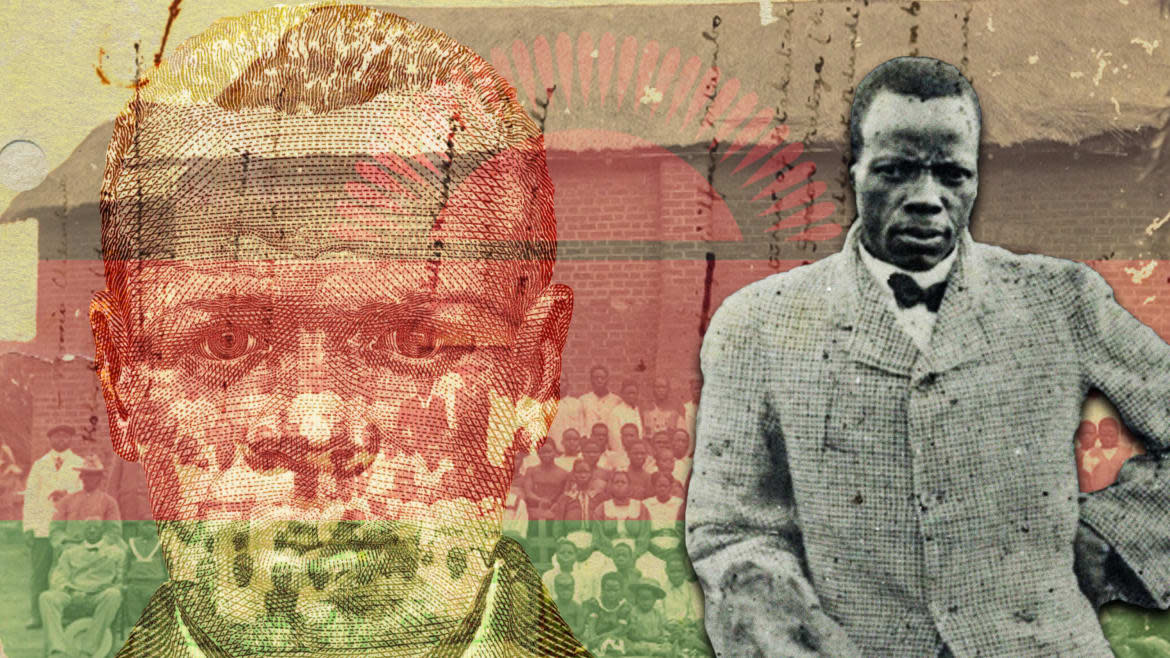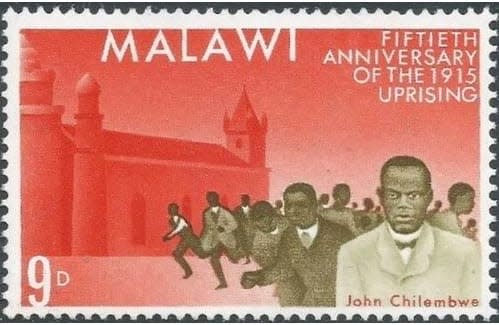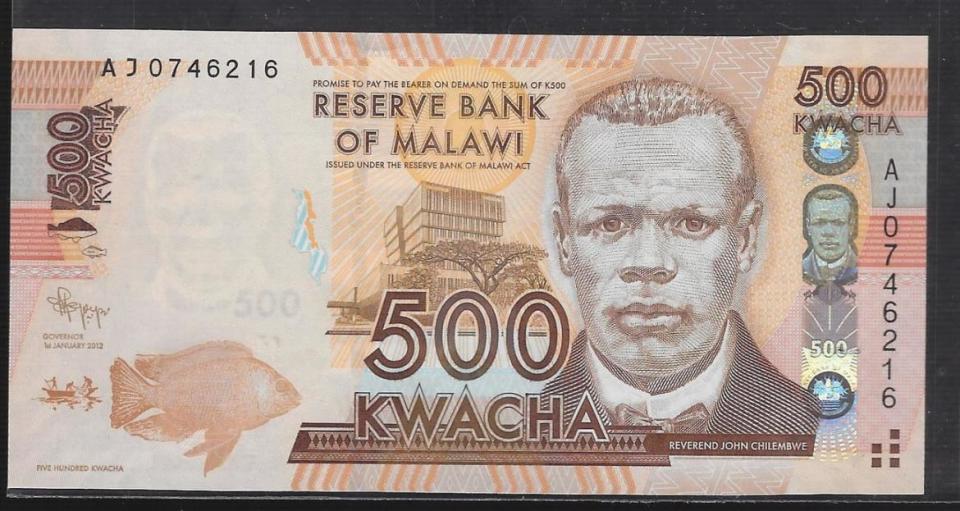Martin Luther King, Jr. Isn’t the Only Black Baptist Hero Being Honored Today

- Oops!Something went wrong.Please try again later.
- Oops!Something went wrong.Please try again later.
As Americans observe the legacy of the Rev. Martin Luther King Jr., many Africans will be observing the legacy of their own Baptist crusader for racial justice, the Rev. John Chilembwe.
King and Chilembwe both led institutions influenced by the National Baptist Convention, a 19th-century network of African American churches with a missionary zeal.
The poignant history of MLK’s Ebenezer Baptist Church in Atlanta has been oft-told: in 1886, John A. Parker, an ex-slave, persuaded a small group of friends to gather for fellowship at a stone marker known as the “Ebenezer.” In 1894, he was succeeded by pastor Adam Daniel “A.D.” Williams, a child of slaves who espoused a program of self-determination inspired by the social gospels and the bootstrap ideals of Booker T. Washington. He urged members to “get a piece of the turf.”
Williams was followed by the Rev. Martin Luther King Sr. in 1931. He married Williams’ daughter, Alberta Christine, and led Ebenezer until 1975—eventually sharing pastoral duties with his son, MLK Jr., until the latter’s assassination in 1968. (Last January, Ebenezer Baptist made history by helping to catapult its pastor, the Rev. Raphael Warnock, to the U.S. Senate in a special election. Warnock became the first Black Senator from GA and is running for re-election to a full term in November.)
The ‘Daddy King’ of the Civil Rights Movement
The story of John Chilembwe began around the same time as the founding of the Ebenezer. He was born about 1871 in a location of southern Africa known for slave trading by African Muslim tribal groups, Arabs, and Portuguese sea captains. His father was a part of the Muslim group; his mother was related to indigenous people from the interior region of mountains and lakes.
The slave trade attracted British missionaries in the mid-19th century. They urged military campaigns to stop the activity and introduce the “civilizing” effect of Christianity—but the British used the campaigns to gain control of the natural resources and Black labor in a region dubbed the “British Central Africa Protectorate.”
Britain expropriated African common land, established a labor system that reduced locals to peonage, and relied on missionaries to teach a Christianity predicated on acceptance of white domination. Southeast Africa was occupied by settlers from Britain, Portugal, and Germany during the 1890s “Scramble for Africa.” African Muslim leaders collaborated with British authorities as plantation supervisors, police, and soldiers.
As a young man, Chilembwe worked as a servant to Joseph Booth, a missionary with doubts about European colonialism. Booth promoted egalitarian ideals while criticizing settlers for their lavish lifestyles and brutal treatment of Africans. In 1897, during a trip to the U.S., he published his objections in a manifesto whose title, “Africa for the Africans,” would become a rallying cry for 20th-century Pan-African activists.
Chilembwe accompanied Booth on that U.S. trip and parted ways after befriending African American Christians like Lewis Jordan, head of the National Baptist Convention. Chilembwe enrolled in the Virginia Seminary, a private historically Black Christian school in Lynchburg.
The Baptists underwrote his education out of their desire to gain emissaries in Africa. In the 1890s, for instance, Black church leaders helped establish “African Independent Churches” to counter European influence. In South Africa, the independents looked to the ancient Ethiopian Orthodox Church for Christian inspiration rather than to centers like Rome, Constantinople, Germany or Britain. Needless to say, white missionaries were alarmed by the rise of “Ethiopianism.”
At the Virginia seminary, Chilembwe learned about the role of Christianity in the abolition of slavery, including the uprisings of Nat Turner, John Brown, and the Haitian Revolution. The school also provided exposure to the “industrial” educational program of Booker T. Washington. The President of Tuskegee Institute (now university) near Montgomery, Alabama, was a popular speaker at Baptist Convention functions.
In 1900, Chilembwe returned to the Protectorate with a new purpose, as detailed in Let Us Die for Africa by Desmond Phiri. Now an ordained minister, Chilembwe staged open-air baptisms and preached the social gospels of racial equality. He founded the “Providence Industrial Mission” on 93 acres with funds and guidance from the Baptist Convention. The PIM included the independent “New Jerusalem Church” that drew congregants from the Church of Scotland in Blantyre, a nearby city.
The PIM had a school with a curriculum inspired by Washington's program: Christian instruction, mechanical crafts, general education, hygiene, self-reliant ideals, farming methods, and western fashions. The school attracted hundreds of recruits from a stretch of African farms and towns that Britain renamed “Nyasaland” in 1907.

By 1912, Chilembwe expanded to seven schools across Nyasaland and Portuguese East Africa with 900 students and model farms that grew cotton, pepper, coffee, rubber, and tea for consumers. Influenced by Washington’s National Negro Business League, Chilembwe established the “Native’s Industrial Union,” a chamber of commerce for African planters and small business owners.
Chilembwe’s work ignited the rise of educated and worldly strivers known as “New Africans.” They started churches, farms and businesses to compete with white settlers. Chilembwe also became a prominent critic of the peonage labor conditions on British plantations. His work drew the ire of the controlling structure of administrators, missionaries, settlers, and African Muslim chiefs, according to Independent African by George Shepperson and Thomas Price.
By 1914, colonial opponents engaged in campaigns to undermine the movement. They destroyed some of Chilembwe’s churches and schools and the businesses of Black competitors. Land was denied to African planters, settlers assaulted Blacks in western clothes, and administrators forced laborers hired by African farmers to work on white plantations. Finally, colonists hatched a plan to deport the Rev. Chilembwe.
As the injustices mounted, Chilembwe recognized that the British would never accept African equality. With his understanding of American abolitionist history, he began to consider the feasibility of leading an armed revolt like Nat Turner. Perhaps the final straw was the misuse of Nyasaland men in assaults against the German colony in East Africa during World War I; many thousands perished from disease, hunger, and overwork—or fighting on behalf of colonial rulers.
On Jan. 23, 1915, Chilembwe and hundreds of supporters staged an uprising against British rule. Nyasaland erupted in a convulsion that went on for days as Africans armed with spears, knives, machetes, clubs, and rifles overran settler estates with deaths and atrocities resulting. It caused the British, German, and Portuguese colonials to stop warring among themselves long enough to organize a counter-attack with genocidal efficiency.

Over a period of weeks, British soldiers, vigilante settler groups, and African Muslim riflemen interrogated, arrested, tortured, and executed hundreds—perhaps thousands—of African Christians. Their churches, schools, farms, and businesses were demolished and suspects deported. Chilembwe was captured when escaping to the mountains, shot, and buried in an unmarked grave.
But while the colonial forces stopped the uprising, they were unable to crush the spirit of the New African Christians; in 1926, the Chilembwe mission was restored and the uprising stands as a prelude to the modern African liberation movements. In 1964, the year MLK was awarded the Nobel Peace Prize for his nonviolent campaigns, Nyasaland became the independent Malawi.
Malawians will commemorate John Chilembwe Day on Sunday, January 15, with a public holiday on Monday, January 17, the same day that Americans honor the legacy of MLK Jr. In closing, African Americans can take pride in the role that the Black Baptist church has played in supporting freedom and equality at home and abroad.
Get the Daily Beast's biggest scoops and scandals delivered right to your inbox. Sign up now.
Stay informed and gain unlimited access to the Daily Beast's unmatched reporting. Subscribe now.

